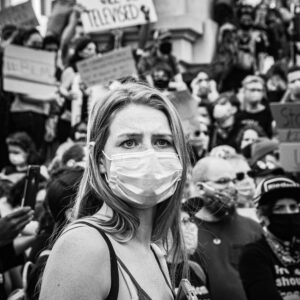As the United States House of Representatives continues to investigate the January 6, 2021 Capitol Hill riots, it is part of the daily news cycle to hear Democratic Party leaders and supporters accuse pro-Trump Republicans of putting their party’s interests ahead of the nation’s interests. They are correct to say this, of course. Trump’s brazen attempt to subvert the peaceful transition of power from one presidential administration to another, as bizarre and foolish as it was, should have evoked strongest criticism from within his own political party. Yet with few exceptions, leading Republicans have remained silent about, or even defended, Trump’s failed coup attempt.
Political parties using power and influence to subvert democracy is not new, nor is it limited to one of the major parties. In this election cycle, Democratic candidates talk about voting rights and existential threats to democracy, but their party demonstrates far more concern with consolidating political power than with saving democracy. The Democrats’ 2022 playbook includes funding far right Republicans, protecting incumbent Democrats from progressive challengers within their own ranks, and continuing their attacks on the Green Party in direct conflict with fundamental democratic principles.
The Democratic Party has also been accused of paying for ads for far-right Republican fringe candidates on the premise that they will defeat their more moderate opponents in the primaries and in turn, be more easily defeated in the general elections. The tactic is a familiar one; some political analysts argue that in 2016 the Clinton campaign used its influence with the media to legitimize the Trump presidential bid, believing that as the Republican candidate he would be easier for political centrist Clinton to defeat.
In Colorado, the state Democratic Party spent $1.5 million to fund a far right candidate in the Republican Party primary for U.S. Senate. In Illinois, the Democratic Party spent a whopping $32 million for the same purpose. This tactic puts the interests of the Democratic Party ahead of the voters it is supposed to serve, with the Democrats betting that even if their money helps a far right candidate to poison the minds of hundreds or even thousands of voters with hateful rhetoric, there won’t be enough of them to determine the outcome of the election.
Democratic congressperson Henry Cuellar from Texas is one of the anti-abortion incumbents in his party, along with the likes of Senators Mancin from West Virginia and Sistema from Arizona. Cuellar recently squeaked through a primary challenge and recount against a popular pro-choice progressive Democrat, Jessica Cisneros, winning the primary by only 289 votes. Cuellar had help from his allegedly pro-choice colleagues, including House Speaker Nancy Pelosi, who actively campaigned for Cuellar and donated money despite Cueller’s anti-abortion position and the cloud from an unexplained FBI raid of his home. Many Democrats in Congress contributed to Cuellar’s primary campaign, including Connecticut Democrats John Larson and Rosa DeLauro.
Here in Connecticut, progressive Democrat Muad Hrezi fought unsuccessfully for the chance to primary incumbent John Larson in the 1st Congressional District this year. Larson has held the seat since 1999 with no significant opposition from inside or outside of his party. Under some of the most burdensome balloting laws in the country, Hrezi was required to get 3,800 signatures of registered voters within the district in order to run against Larson in the Democratic primary. His campaign submitted 5,200 signatures, but local town clerks invalidated enough signatures that he was left with less than the qualifying number.
Hrezi challenged the process in court arguing that a combination of inaction by the Secretary of State’s office and the difficulty of collecting live signatures during the Covid pandemic prevented him from qualifying. Larson’s campaign argued that allowing Hrezi to primary the long-term incumbent would “confuse” voters and cause “unfair prejudice.”
In North Carolina a campaign for US Senate by an anti-war veteran and Green Party activist, Matthew Hoh, and an effort to obtain minor party recognition by the North Carolina Green Party, drew fire from the state Democratic Party. Hoh’s campaign collected over 22,000 signatures of registered voters to get on the ballot. The state’s county boards of election validated almost 16,000 of the signatures submitted, seemingly still far more than the rigorous threshold of 13,865 valid signatures.
Democrats responded with both barrels. First, according to The Carolina Journal, voters who signed petitions for the Green Party candidate were “repeatedly called, texted, and visited at home by Democrat operatives and asked to sign forms to renounce their earlier signature of the petition.” Second, the North Carolina Board of Elections voted – along party lines, three Democrats to two Republicans – to deny the Green Party and Hoh a place on the ballot. In the meeting, Democrats raised unfounded allegations that large numbers of petition signatures might be fraudulent – the tactic of alleging voter fraud without the trouble of any evidence seemingly something that they learned from the Trump campaign. The result: barring the success of a lawsuit filed by the campaign, the massive grassroots effort to get Matthew Hoh and the North Carolina Green Party on the ballot will fail based solely on Democrats’ fear of political rivalry from their left.
None of the tactics described here are new, but the extent to which they have become essential elements of the Democratic Party’s playbook casts a dark shadow over the 2022 elections. In 2020, some Biden supporters rallied around the apocalyptic slogan that if he failed to win the presidency it might be “America’s last election.” It is both ironic and deeply troubling that in 2022 the Democratic Party poses a major threat to the future of democratic elections.
Peter Goselin has practiced labor and employment law in the Hartford area for more than 25 years. He is a member of the Connecticut chapter of the National Lawyers Guild and a co-chair of the Green Party of Connecticut.






